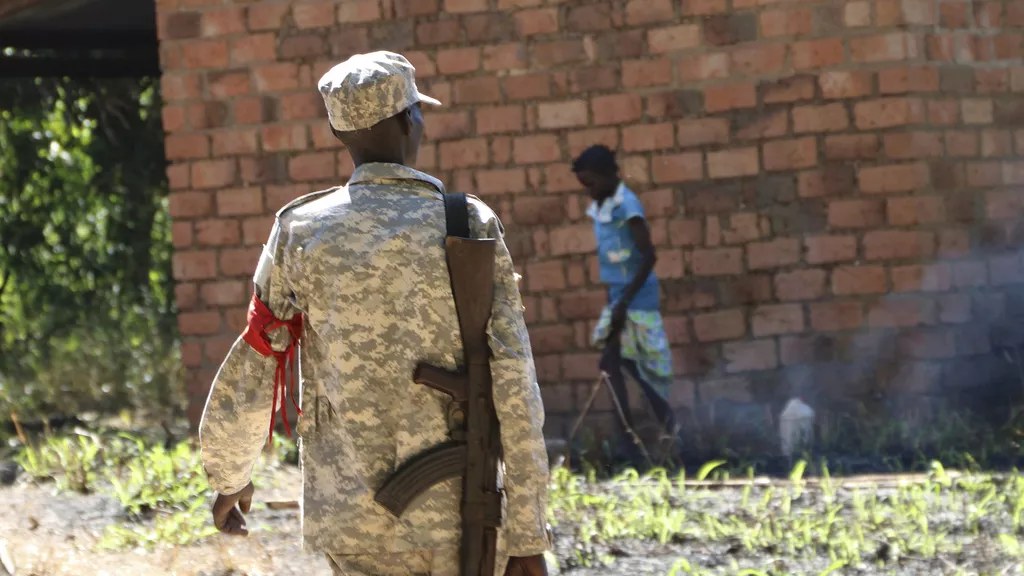Gunfire breaks out at the home of South Sudan’s former spy chief who is under house arrest
3 min read
Heavy gunfire erupted late Thursday night in South Sudan’s capital, Juba, near the home of the country’s former spy chief, Gen. Akol Koor, who has been under house arrest for two months. Witnesses reported that soldiers exchanged fire with Koor’s security guards in the high-end neighborhood of Thongpiny for approximately an hour, creating panic among residents.
According to local reports, the gunfire caused significant distress in the area, with people rushing to take cover. Ter Manyang Gatwech, a witness, described how shops in the vicinity were hurriedly shut as gunshots rang out. Thongpiny is a bustling neighborhood located close to both the military headquarters and the main international airport, making it a key area in Juba.
The South Sudanese army confirmed that two people were injured during the exchange. Army spokesperson Lul Ruai Koang stated that the incident was the result of a misunderstanding between the army and the security forces stationed at Koor’s residence. He promised to provide further details on Friday regarding the circumstances surrounding the altercation.
Koor, who had served as South Sudan’s intelligence chief since the country’s independence in 2011, was placed under house arrest in early October after being dismissed from his position. Prior to this, he had been appointed as a state governor but was also removed from that role before he could take office. His house arrest and the reasons for his dismissal remain unexplained by the government, sparking speculation and concern about the political instability in the country.
South Sudan’s fragile political landscape has been under intense scrutiny since the signing of the 2018 peace agreement, which ended a devastating five-year civil war that claimed over 400,000 lives. Despite the peace agreement, the country continues to struggle with the full implementation of the terms. President Salva Kiir and his former rival turned deputy, Riek Machar, have been jointly tasked with overseeing the peace process, but critics argue that progress has been slower than expected.
The outbreak of gunfire at Koor’s residence highlights ongoing tensions within South Sudan’s political and military factions. Koor’s house arrest and the unclear reasons for his dismissal have led many to question the true state of governance and power dynamics in the country. The incident also raises concerns about the security and stability of the capital, Juba, which is home to key government institutions and foreign diplomatic missions.
South Sudan has faced significant challenges in its post-war recovery, with the peace process still incomplete. The country was supposed to hold elections in December, but these have been postponed for two years to allow time for the implementation of key aspects of the peace agreement. The delay is intended to provide the electoral body with sufficient time to conduct voter registration and ensure that the country is ready for a fair and peaceful election.
The postponement of elections and the uncertainty surrounding Koor’s detention illustrate the ongoing fragility of South Sudan’s political environment. Although the country’s leaders continue to claim progress, many believe that more needs to be done to stabilize the situation and restore public trust in the government.
The latest incident adds to the growing concerns over South Sudan’s future. With key players like Koor being sidelined and tensions within the military and government factions continuing to rise, there is a real risk of further instability. As the country navigates its recovery from civil war and the challenges of implementing peace, the ability of its leadership to manage internal conflicts and maintain security will be crucial in determining whether South Sudan can overcome its turbulent history and build a more stable future.
As the government remains tight-lipped about Koor’s house arrest and the reasons behind it, the situation in Juba continues to evolve. Residents, who have already endured years of violence and upheaval, now face yet another episode of uncertainty, as the country’s fragile peace hangs in the balance.







